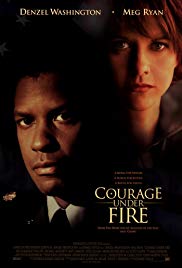JUSTICE
1. Why was it important that the killers of Captain Walden be brought to justice? Why is justice important at all?
Suggested Response:
One of the most basic and essential human rights is the right to justice. Captain Walden was dead, but that did not diminish this right. In addition, her child and her parents had the right to justice. A society that abandons the commitment to justice and the rule of law will disintegrate into chaos. The strong will oppress the weak; the weak will strike back; murder and social disorder will result. It was said that before the 1994 genocide, Rwanda suffered from a “culture of impunity” in which wrongdoers went unpunished. This is considered to be a major factor in causing the chaos in which almost a million Tutsis were brutally murdered by their Hutu countrymen, often by their friends and neighbors. See Learning Guide to “Hotel Rwanda”.
2. What penalty, if any, should Colonel Serling have suffered as the result of blowing up Captain Boylar’s tank, or, as occurred in the movie, should he have been exonerated?
Suggested Response:
The answer lies in whether or not Colonel Serling was violating any procedures when he ordered his tank to fire or whether the death of Captain Boylar was an accident of war. It appears that it was just an accident and Colonel Serling should not be punished at all.
3. Evaluate the guilt of the medic, Ilario, in Captain Walden’s death. Did he commit first-degree murder, the premeditated killing of another? Or did he commit a lesser crime, either a knowing killing under mitigating circumstances (call this second-degree murder) or an unintentional killing through negligence (call this manslaughter)? Or was he not guilty of the killing at all, being simply an accessory after the fact for keeping silent when Monfriez lied and told the helicopter pilot that Captain Walden was dead?
Suggested Response:
A strong case could be made that Ilario was guilty of first-degree murder because Captain Walden was still alive when he kept silent in the helicopter. Her murder was an ongoing action at that time and he participated by keeping silent. In addition, he had been insubordinate and would have been court-martialed had the Captain lived. Thus he had an interest in her death. It would be hard to believe that Ilario kept silent only because he was afraid of Monfriez. His actions were worse than negligence because he intentionally did something (he kept quiet when Monfriez lied) which resulted in harm to another person, knowing that such harm was the likely result of his action. He had an obligation to help Captain Walden not only because she was a member of his unit but also because she was a human being in need. Ilario could claim it was second-degree murder as we have defined it. He would argue that he was justifiably afraid of Monfriez and that his fear was a mitigating factor. This argument would probably not prevail because of his own personal interest in having Captain Walden die so that he would escape punishment.
MARRIAGE
4. Evaluate Colonel Serling’s marriage. Did he and his wife care for each other? What about the times that his wife wanted to help him with what was troubling him and Colonel Serling rejected her offers?
Suggested Response:
He had a good marriage plagued by a problem suffered by many military marriages. The men believe that strength means keeping their problems to themselves and that they don’t need emotional help in times of stress. When his wife wanted to help him, he should have accepted the offer. The shared experience would have improved their relationship.
5. Was there a connection between Colonel Serling’s drinking and his inability to share his problems with his wife? (This question assumes that Colonel Serling was not an alcoholic.)
Suggested Response:
Serling was drinking to dull the emotional pain that he felt. Alcohol will never help solve problems in life. Had Colonel Serling been able to talk about the situation with his wife, he probably would not have needed to resort to alcohol. (If Colonel Serling had been an alcoholic, no amount of talking with his wife would have helped relieve him of the need to drink alcohol. Treatment, usually in the form of a 12 step program such as Alcoholics Anonymous, is usually necessary to arrest alcoholism.)
REDEMPTION
6. What motivated Colonel Serling to risk his career to find out the truth about Captain Walden?
Suggested Response:
He sought redemption for having killed Captain Boylar and lied about it to Captain Boylar’s parents. He also believed in justice.
7. What motivated Colonel Serling to tell Captain Boylar’s parents the truth about how their son died?
Suggested Response:
You cannot begin to heal from having committed a wrong until you acknowledge your error and take the consequences of what you have done. Colonel Serling couldn’t begin to heal from the guilt he felt for having killed Captain Boylar with the lie in his mouth.
8. What motivated Colonel Serling to give the tape to the Washington Post reporter before he knew what it said? Note that reporters have been known to ruin the careers of government officials: see All The President’s Men.
Suggested Response:
Serling knew that he had to face the truth, whatever it was. If he was at fault for the death of Captain Boylar, then the truth should come out and he had to face that truth and its consequences.
9. What motivated Colonel Serling to go against the instructions of his senior officer relating to the investigation of Captain Walden’s Medal of Honor?
Suggested Response:
He was seeking redemption for the death of Captain Boylar and the lie that he had told to Captain Boylar’s parents. Serling also believed in justice and that everyone, including Captains Boylar and Walden, should get justice.
10. What actions did Colonel Serling take in this film to redeem himself? Name three.
Suggested Response:
They include the following: He persevered until he found out what had happened to Captain Walden. He gave the tape to the reporter. He told Captain Boylar’s parents what had really happened and retracted his lie.
LEADERSHIP
11. Compare the leadership styles of Colonel Serling, Colonel Serling’s Commander, and Captain Walden. What are the pros and cons of each?
SUICIDE
12. Which character in the movie made the wrong choice each time that he was faced with a moral dilemma or a major decision affecting his life or the lives of others? What choices did he make and why were they wrong?
Suggested Response:
Monfriez makes the wrong choices. Here are a few examples: He lies about Captain Walden’s condition and causes her death. He intimidates Ilario into going along with it and keeping the secret. He commits suicide when he is caught rather than seeking redemption.
13. Was there a way for Monfriez to redeem himself or was the only way out suicide?
Suggested Response:
Absolutely. You confess, apologize, take your punishment and wherever you are, in jail or out, you try to help other people.
ALCOHOL AND DRUG ABUSE
See Handout on Alcohol and How it Affects Us
14. Why did Colonel Serling get drunk? Was he an alcoholic?
Suggested Response:
Colonel Serling drank to dull the pain he felt for having caused Captain Boylar’s death and then lying about it. He drank to numb the guilt. He didn’t seem to be an alcoholic because he was able, eventually, to deal with the situation. Classic alcoholics appear to metabolize alcohol differently than non-alcoholics. Their drinking can go out of control when they are happy as well as when they are sad or distressed. Treatment, usually in the form of a 12-step program such as Alcoholics Anonymous, is usually necessary to arrest alcoholism.
COURAGE IN WAR
15. Was Monfreiz’ problem that he was simply afraid and wanted to get out of the combat situation?
Suggested Response:
No. That was only part of it. Monfriez was selfish and didn’t know how to make decisions that he would be proud of in the long run.



